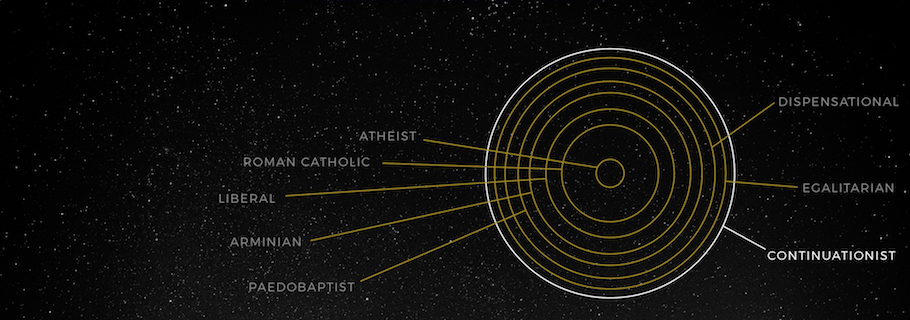Today I come to the end of the series I’ve titled “Why I Am Not…” The purpose of this series has been to take a look at the things I do not believe and all along it has been my desire to explain rather than persuade. So far I have told why I am not atheist, Roman Catholic, liberal, Arminian, paedobaptist, dispensational, or egalitarian. Today I want to explain why I am not continuationist or, if you prefer, charismatic.
Once again we need to begin with definitions. “Continuationism is the belief that the supernatural gifts of the Holy Spirit taught in the Bible—such as prophecy, tongues, interpretation of tongues, healings, and miracles—have not ceased and are available for the believer today. Continuationism is the opposite of cessationism which teaches that supernatural gifts have ceased either when the canon of Scripture was completed or at the death of the last apostle.”* In other words, this is a matter of whether certain miraculous gifts that were active at one time are still active today. I believe those miraculous gifts have ceased.
Once again, my beliefs on this matter are not easily separated from my background. Growing up in conservative, Reformed churches I knew no continuationists. I knew that such people existed only when I heard my parents speak sheepishly about their early introduction to Pentecostalism. They told us of their attempts to receive the gift and their growing acknowledgement that their tongues-speaking friends were simply uttering repetitive, nonsensical phrases. It was not until I was in my mid-twenties and a baptist that I first encountered tongues. The band at a worship conference entered into a time of “spontaneous worship” and immediately many of the people around me began to make strange sounds. It took me a few minutes to understand what was happening.
A more formal introduction to continuationism came when I encountered Sovereign Grace Ministries. I had first become aware of this ministry through online connections and then through C.J. Mahaney’s books. I attended one of their worship conferences and here I saw what they called prophecy—prophetic songs meant to communicate divine truth to people in the audience. (“The Holy Spirit is giving me a song. I believe this song is for all the people here named Katie. If your name is Katie, please come to the front as the Holy Spirit has something to say to you.”) What I found at that conference and in these churches were people who were godly and kind and committed to Reformed theology, yet also firmly charismatic. Though I was certainly underwhelmed by this example of prophecy, I was so taken by the people, by their love for the Lord, and by their excitement in worship that I returned home wondering whether my family should find a way of joining them. For the first time I saw that continuationism was not necessarily opposed to sound doctrine.
It was at this time and in this context that I began to read, that I began to ponder, and that I began to search the Bible to see what it says about the continuation or cessation of the miraculous gifts. I read defenses of continuationism written by the theologians of the charismatic movement: Wayne Grudem and Sam Storms come to mind. I saw leaders I admire profess their view that the gifts continue to be operative today. I also read MacArthur’s Charismatic Chaos, interviewed Sam Waldron, and read a number of critiques of continuationism. Through it all I became increasingly convinced that the miraculous gifts have ceased. I could not be continuationist.
I am not continuationist because of my understanding of the Bible. I see that those miraculous gifts were given for a specific time and purpose—they were given to accredit the message of the gospel when it was first going forth and before the Bible had been completed. As that time and purpose drew to a close, so too did the gifts. This is easily seen when we read the New Testament with an eye to when the different books were written. While an early book like 1 Corinthians has a lot to say about miraculous gifts, later books have far less to say. In fact, by the time Paul is writing to Timothy he is not expecting that Timothy will experience a miracle and not instructing him to pursue one, but rather prescribing a very ordinary cure for an ailment—“have a little wine for the sake of your stomach.” Paul himself suffered with physical pain but was unable to receive a miraculous cure. As we read through the New Testament we see these gifts slow and cease over the course of decades.
The miraculous gifts I see and hear in the charismatic movement have only the barest resemblance to the New Testament gifts.
First, then, I am not continuationist for biblical reasons. But second, I am not continuationist for reasons related to observation and experience. The miraculous gifts I see and hear in the charismatic movement have only the barest resemblance to the New Testament gifts. The miracles are internal and unverifiable, the tongues angelic rather than actual, the prophecy fallible. I know of no credible accounts of the kind of dramatic miracles we see described in the New Testament—a limb regenerating, a dead and decaying man being raised. Whatever “miracles” I hear of today are nowhere near as dramatic, visible, and instantaneous as the ones we see described in the ministry of Jesus and his Apostles. I know of no Christian who has been able to preach the gospel in a language he does not know. A number of times I have had well-meaning people prophecy to or about me but these have always been vague impressions more than authoritative words from God. Even as we discuss continuationism, we need to acknowledge that what has continued is, at best, a mere shadow of what the Bible describes.
I am not continuationist and do not believe that my experience of the Christian faith and life suffer on that basis. Instead of focusing on the drama of the miraculous I find joy in the beauty of God’s ordinary providence. The great drama unfolding in, through, and around us is foremost a story of God working through his careful, constant providence, his moment-by-moment means of bringing about his will.
I would like to direct you to two recent resources that have been helpful to me. The first is an exchange between Sam Storms and Thomas Schreiner. Schreiner explains Why I Am a Cessationist and Storms explains Why I Am a Continuationist. Both men explain their position and I suppose you can easily guess which I found more compelling. The second resource is this excellent lecture from Phil Johnson in which in his inimitable way he explains Why I Am Cessationist.










